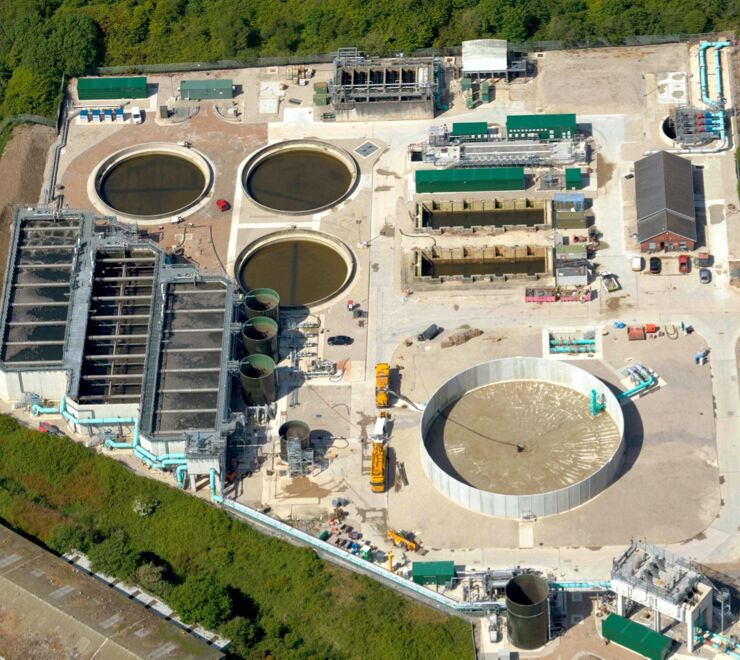
United Utilities, which is responsible for water and wastewater services in north west England, has used NEC to deliver a major upgrade to its sewage works in the coastal town of Morecambe in Lancashire. The project won the Utility Project of the Year in the 2020 British Construction Industry Awards.
Following ten months of early contractor involvement, the company let the £52.5 million scheme in February 2017 to C2V+, a joint venture of Jacobs (formerly CH2M) and Volker Stevin, under an NEC3 Engineering and Construction Contact (ECC) Option C (target cost with activity schedule). Work started on site in April 2017 and the project was handed over on time and within budget in December 2020. United Utilities was NEC project manager.
C2V+ also used ECC Option C for the mechanical, electrical, instrumentation, control and automation (MEICA) design and installation package and ECC Option A (priced contract with activity schedule) for most other subcontracts. Scheme design was undertaken in-house by Jacobs. The project involved more than doubling the stormwater storage of Morecambe’s sewage pumping station at Schola Green in the town centre and increasing the capacity of its wastewater treatment works 4.5 km to the south in the village of Middleton. Reducing storm overflows and the introduction of a tidal discharge for treated effluent has improved bathing water quality in Morecambe Bay, the UK’s largest expanse of intertidal mudflats and sand, and provided resilience to meet future population growth.
The works included building two new reinforced concrete covered storm tanks at Schola Green with capacities of 11,000 m3 and 13,000 m3 and laying a second 500 mm diameter, 6 km long sewage transfer main to Middleton. At Morecambe wastewater treatment works the biological treatment process was completely replaced using the latest Nereda technology along with the installation of a new ultraviolet treatment plants; five existing treatment tanks were converted into tidal storage and an additional new tank constructed; the land-based section of the existing sea outfall was upgraded; and the four outfall diffusers were upgraded in the tidal mudflats. All works were undertaken within the footprints of the existing sites.
Industry-recognised contracts
Whole life programme manager Geraud Ramond says, ‘United Utilities has used NEC3 for all projects in our major capital programme since 2015. NEC was deemed the best fit across such a large programme of work because it provides the common understanding and consistency of approach of an industry-recognised suite of contracts; it offers flexibility of different payment approaches and secondary options; and, uniquely, it creates an environment in which the parties must work together in a “spirit of mutual trust and co-operation”.'
He says many construction professionals across the industry are familiar with NEC’s format and application, leading to a common understanding from the outset rather than having the learning curve of a new or bespoke contract. ‘The contracts are also written in simple and easy-to-understand language.’
Ramond says the flexibility in payment options and secondary option clauses allow the employer to select the most appropriate approach for any given project. ‘The ECC Option C target price contract was deemed to promote the sharing of risk and the setting of common goals that was required on the Morecambe project.’
Early warning mechanism
He says the NEC early warning mechanism and strict timescales to be adhered to for administering compensation events served as a proactive dispute resolution mechanism. ‘This ensured that the parties worked collaboratively to resolve any issues and reach agreement up front, rather than leaving any potential disputes to the end of the contract.
‘From the point of contract award, the client and contractor agreed to follow the contract to the letter and respect all its constraints in terms of response time. It was also decided that the early warnings would be used − even if though we collocated ourselves on site − to keep trace of any arising risks and issues.’
United Utilities used CEMAR contract management software to assist with the administration of the contract. ‘The software is aligned with NEC contractual clauses and mechanisms and has received universally positive feedback from the project team for helping them to carry out their roles more efficiently,’ says Ramond.
‘Regular risk-reduction meetings were scheduled to review the early warning notices and risk register and agree, implement and monitor risk mitigation measures. At every monthly joint progress meeting, the CEMAR screens for both the client and contractor were displayed and any outstanding actions were reviewed to close them out as soon as possible.’
He says that compensation events and project manager instructions were also reviewed regularly and quotes were provided in a timely manner by the contractor, helping the project remain on budget and programme. Defects too were raised quickly and reviewed monthly as part of the commissioning meetings.’
The net result was that the project met its two Environment Agency permit dates, which were to reduce storm overflows from Schola Green to two per bathing season and 10 per year by July 2019, and to dilute outfall effluent from Morecambe wastewater treatment works by March 2020, which was achieved by creating enough storage to limit discharges to high tide.
Benefits of using NEC
- NEC created an environment in which the parties had to work together in a ‘spirit of mutual trust and co-operation’. As in an industry-recognised contract written in simple and easy-to-understand language, it also provided a common understanding and consistency of approach from the outset.
- NEC flexibility in payment options and secondary option clauses allowed the employer to select the most appropriate approach. On this contract, ECC Option C was chosen to promote the sharing of risk and the setting of common goals.
- NEC early warning mechanism ensured the parties worked collaboratively to resolve any issues and reach agreement up front, rather than leaving any potential disputes to the end of the contract.
By Simon Fullalove




